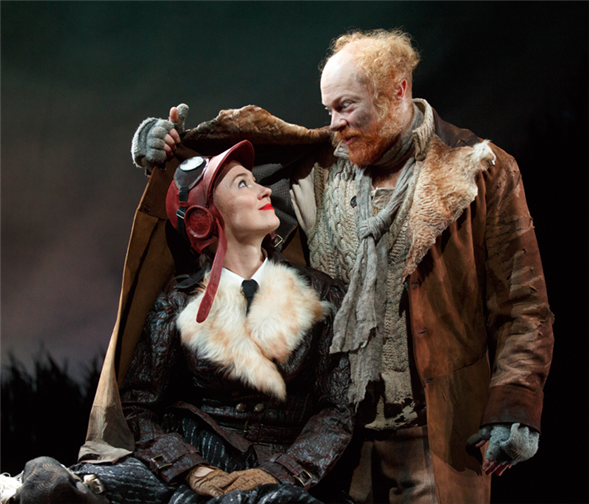Translate Page

A new play uses animals and humans to question our power to change
---
To what extent are we capable of "resisting our givens"—of fighting the conditions inscribed in our very DNA? Jen Silverman is obsessed with this question.
That's obvious in her play The Moors, now at Yale Repertory Theatre. Set on a looming British landscape, where the weak can be trampled by Victorian class strictures and the harsh natural environment, the show is pervaded by the conflicts between primal nature and social intention.
Not even the animals can escape this problem. In one storyline, a melancholy mastiff beset by existential angst falls hopelessly and unexpectedly in love with a small, spacey moorhen. Out on the moors, mastiffs (huge, carnivorous hunters) naturally prey on the small, duck-like birds, yet this Mastiff is determined to take care of his Moor-Hen. In his desire to overcome a possible relationship obstacle, the Mastiff says, "I was thinking, what if I learned to fly?"
When that doesn't work, he suggests, "Maybe you could not fly." But the Moor-Hen, who accepts her natural givens with a profound clarity, says to him: "I just. I am something that flies. That’s all." Things only get worse from there.
Watching this pair of poorly matched animals innocently try to make it work is both funny and poignant. For in the difficulties they face one can recognize the very human struggle to understand what can—and can’t—be changed about ourselves.
{Image1}
Such questions about the possibility for change underlie Silverman's approach to playwriting. An enthusiast of David Attenborough and National Geographic, she enjoys studying animals as a means of understanding people. "All of us are operating within a specific and dangerous set of givens, and the thing that makes humans a little different is that we’re resisting our givens, whereas a spider generally isn’t," she says.
And indeed, the human characters in The Moors negotiate their conditions as much as the animals do. A depressed spinster yearns for fame, attempting to transform herself into a glamorous writer though she exhibits no apparent talent for the task. A governess decides that by learning the rules of the game she has found herself in, rather than resisting them, she has a better shot at improving her life.
Some of the characters win their battle against the hand they've been dealt. Others lose. For Silverman, there remains an open, and perhaps permanent, question about which parts of our selves are truly adaptable. "I haven't quite solved in my head whether humans are capable of [fundamental transformation] or not," she says. "But whether it’s you or me or a mouse, we are all in conversation with our givens at any moment."
---
Lynda Paul is a writer and dramaturg based in New Haven
Photos by Joan Marcus. Top photo: Jessica Love as the Moor-Hen and Jeff Biehl as the Mastiff.
TDF Members: Click here to see our discounted tickets for theatre, dance, and concerts.